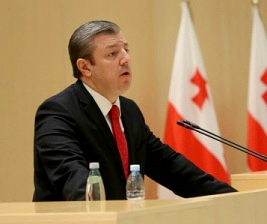
TBILISI, DFWatch–An initiative by the prime minister of Georgia to protect the Abkhaz language has been rejected by Abkhazia’s de facto authorities as ‘Georgian populism’, ‘hypocrisy’ and ‘cynicism’.
On 27th of October, the day of Abkhaz language, PM Giorgi Kvirikashvili announced a new program for the protection and development of the language, which is spoken by a hundred thousand people primarily in the breakaway region.
The effort will be ‘a very important basis for the confidence building process’, the PM anticipated during a government session in Tbilisi.
The new program envisages multilateral measures.
“Of course, the budget will be allocated and I am sure that the society will be actively involved in implementing this program. I believe that our sincere and in-depth attitude towards Abkhaz language and culture will be very important in the restoration of the burned bridges that are necessary for our unity,” Kvirikashvili stated.
But in the breakaway capital Sokhumi, his conciliatory gesture was not as well received as could be hoped for. The next day, the de facto ministry of foreign affairs issued a statement saying that ‘the Georgian government’s policy towards Abkhazia and its people is populist and hypocritical.’
The reason for Sokhumi’s cold shoulder was that ‘Georgian authorities are implementing international isolation, aggressive and hostile policies against Abkhazia and its citizens,’ the statement explained.
“We would like to remind the Prime Minister of Georgia, who suddenly became concerned with the problems of preserving the Abkhaz language, that on October 22, 1992, Georgian armed units in occupied Sukhum burned the buildings of the Abkhaz Institute of Language, Literature and History and the State Archives of Abkhazia.”
“As a result of this act of vandalism, unique documents and materials on the history and culture of Abkhazia were destroyed. These facts once again show that over the years, all the efforts of the Georgian political elite have been aimed at total destruction and genocide of the Abkhazian people, in the extermination of its historical memory and cultural identity.
“Against this backdrop, attempts by the present leadership of Georgia to create the appearance of concern for the culture and traditions of the Abkhaz people, with respect to which Georgia committed an act of armed aggression and tried to completely destroy, are absolutely cynical,” the statement reads.
A similar message appears in the blog of the Abkhazian pro-governmental journalist Izida Chania, which is published on the Ekho Kavkaza website, under the headline ‘Care for Abkhaz Language and other Symptoms of Schizophrenia’.
“The idea of repentance for what Georgia has done against Abkhazia does not comply with the present day – the requirements of the blockade of Abkhazia, the protests of Georgian politicians against the study of the Abkhaz language in the schools of the Gali district, with the policy of isolating Abkhazia into which Georgia has involved the countries of Europe.
“I’m sure that the proposal of the Georgian PM was considered cynical not only in Abkhazia, but also in Georgia, where you can stand up for example, the Megrelian language, which belongs to the Kartvelian language family but does not have its own written language, or Svan, which also needs state support,” Izida Chania writes.
However, she acknowledges that problem of Abkhaz language protection is ‘serious’.
There has been a strong concern among the ethnic Abkhaz population that their language may go extinct, as Russian dominates in public life, despite efforts to raise the language’s status by making it nominally the language for state affairs, inscribed in the constitution. This has not borne out in practical reality as political debates and affairs in both parliament and government are conducted in Russian. The schools also pay little attention to the Abkhaz language and only teach it in primary school. 80% of TV broadcasting in Abkhazia is in Russian.
The Georgian constitution defines the Abkhaz as one of two official languages in the Autonomous Republic of Abkhazia.

